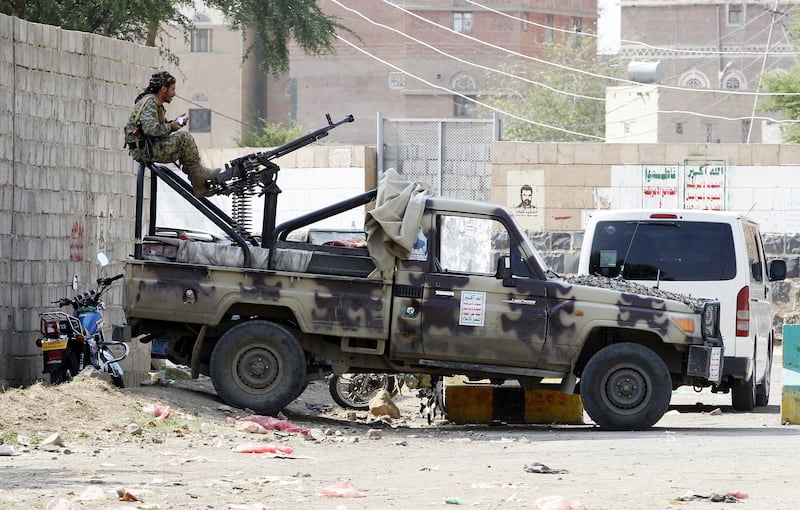Houthi rebels in Yemen have placed former president Ali Abdullah Saleh under house arrest, showing signs of a complete breakdown in his loose alliance with the rebel group in Sanaa, according to local media.
Sources from the General People's Congress party told Aden Al Gad, an Aden-based daily, that Houthi militias surrounded Mr Saleh's residence and established a checkpoint in an attempt to find other members of his party.
The Houthi rebels have also seized the Charter Institute in Sanaa, which serves as one of the most important administrative structures to the former president’s political party.
Houthi forces also surrounded the residence of one of Mr Saleh’s son, Salah, who was reportedly injured during a skirmish between the two sides on Saturday night in which a senior Saleh aide was killed.
Col Khaled Al Radhi and Salah Saleh, were caught up in the fighting that ensued when their convoy was stopped at a Houthi checkpoint, residents said. The GPC announced Al Radhi's death the next day, while the Houthis said two of their fighters were killed.
____________
Read more:
[ Pro-Saleh colonel killed in fighting with Houthi allies in Sanaa ]
[ Editorial: An end to the Houthi-Saleh alliance is long overdue ]
[ Thousands attend Yemen rally to mark 35th anniversary of Saleh party ]
_______________
Mr Saleh's forces and the Houthis have been fighting together against the government and the Saudi-led coalition supporting it, but appear to have fallen out after leaders from each side gave speeches criticising the other in the past week.
The coalition, of which the UAE is a member, intervened in the war in 2015. It continues to conduct air strikes against rebel positions and is supporting an offensive launched in January to retake Yemen's Red Sea coast from the rebels.
UAE Minister of State for Foreign Affairs, Dr Anwar Gargash, tweeted on Monday that the showdown between Mr Saleh and the Houthi rebels “can have major repercussions on the political and humanitarian aspect of [the] Yemen crisis”.
Current showdown in Sana between Saleh & the Houthis can have major reprucussions on the political & humanitarian aspects of Yemen crisis.
— د. أنور قرقاش (@AnwarGargash) August 28, 2017
Houthi subjugation of the Congress will prolong conflict with its dire humanitarian consequences. Brittle situation playing live right now.
— د. أنور قرقاش (@AnwarGargash) August 28, 2017
The war in Yemen has pushed the already impoverished country to the brink of famine, and killed more than 8,400 civilians.
“The alliance between Houthis and Saleh is officially over and it will only get worse,” said Nadwa Al Dawsari, a senior fellow at the Project on Middle East Democracy. “The result of this conflict will determine the future of Yemen.”
Although the former president’s popularity has increased, Mr Saleh cannot isolate himself from the Houthis as the rebel group seem to have the upper hand militarily in Sanaa. Nonetheless, the marriage of convenience, as it is often called, is likely to come to a complete breakdown, said Ms Al Dawsari.
It is difficult to predict how the future of their relationship will pan out at the moment, she said, “but one will have to eliminate the other to survive".
“Saleh and Houthis are enemies. They always have been. They are now each other’s' worse enemy,” she added.
Ms Al Dawsari said the best chance of survival for Mr Saleh and his party was to join forces with president Abdrabu Mansur Hadi and the coalition to defeat the Houthis. Mediation efforts might occur but are unlikely to produce any results.
“Get prepared for another humanitarian disaster," she said. "Sanaa is a big city and has been hosting hundreds of thousands" of people already displaced from other areas by the war.





